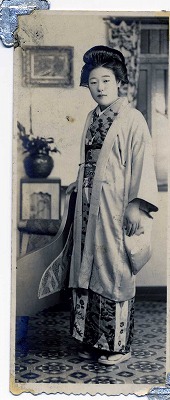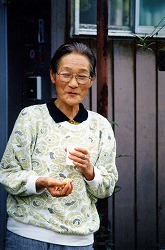 She was born in the Taisho era 8(1919). 彼女は大正8年(1919年)に生まれました。 In the old days, Japanese women usually were wearing Kimono. 昔は日本女性はたいてい着物を着ていました。 |
 |
| Her first husband was killed in the Second World War and she married again
with my father-in-law. |
|
| 義母の最初の夫は第2次世界大戦で戦死して、義父と再婚しました。 | |
| She didn't like his character but she had to put up with it because a second marriage. |
|
| 彼女は彼の性格が好きではありませんでしたが、再婚なのでがまんしなければなりませんでした。 | |
| According to my husband, they always fought about everything. |
|
| 私の夫によると、彼らは事あるごとに喧嘩していました。 | |
| So he thought "If I marry, I won't fight with my wife." |
|
| それで彼は思いました。「もし結婚したら、僕は妻と喧嘩しない」 | |
| After we married, they fought as well . | |
| 私たちが結婚した後も、同様に彼らは喧嘩していました。 | |
| By the way, she taught me some home-cooking. | |
| ところで彼女は私にいくつかの家庭料理を教えてくれました。 | |
| For example, boiling-okara, rolled-cabbage, horohorotamago (Japanese scrambled eggs) and so on. |
|
| たとえば、おからの煮物やロールキャベツやほろほろ卵(和風いり卵)などです。 | |
| Especially I was impressed by how to boil a bracken. | |
| 特に、私はわらびのゆでかたに感動しました。 | |
| When I broke the dish, she said "Never mind. If nobody break a dish,
dish-shop will go under." |
|
| 私がお皿を割った時、彼女は言いました。 「気にしなくてもいい。もし誰もお皿を割らなかったら、茶碗屋はつぶれてしまう。」 |
|
go under つぶれる、倒産する |
|
| She was different from my mother on the some points. | |
| 彼女は私の母とは、いろいろな点で違いました。 | |
| She was a person with a big heart. | |
| 彼女は大らかな心の持ち主でした。 | |
| Then I thought why on earth, does she always fight with her husband? | |
| それなら、一体全体なんで彼女はいつも夫と喧嘩するんだろうか?と私は思いました。 | |
why on earth 一体全体なぜ |
|
| When my 3 daughters were children, they often went to the grandma's room
and watched a TV program of "Mitokoumon" together. |
|
| 私の3人の娘たちが子供の頃、よくばあちゃんの部屋へ行って、一緒に水戸黄門のテレビを見ました。 | |
| It was a popular historical drama in Japan. | |
| それは日本で人気のある時代劇でした。 | |
| Mitokoumon was a one pattern drama but that's the fun part. | |
| 水戸黄門はワンパターンドラマでしたが、そこがおもしろいのです。 | |
| She had lots of friends. | |
| 彼女にはたくさんの友達がいました。 | |
| She had a long chat for 2 hours per one person. | |
| 彼女は1人あたり、2時間おしゃべりをしていました。 | |
| But actually she was a diabetic and intestinal obstruction. | |
| でも実は彼女は糖尿病患者であり、また腸閉塞でもありました。 | |
| So she lived her later years in sufferings. | |
| それで彼女は晩年、苦しんで過ごしました。 | |
later years 晩年 |
|
| She passed away in winter morning 12 years ago. | |
| 彼女は12年前(2003年)の冬の朝に亡くなりました。 | |
| My eldest daughter was home for university winter vacation and she was just going to the Kanazawa-station in that morning. |
|
| 私の長女が大学の冬休みで帰省していて、その朝に金沢駅へちょうど行くところでした。 | |
| I said to her "Your grandma is taking a bath now, so say good-bye to her." | |
| 私は娘に言いました。「ばあちゃんが今、お風呂に入っているから、さよならしておいで。」 | |
| Because of intestinal obstruction , she had to take a bath only in early morning. | |
| 腸閉塞のために、彼女は早朝でないとお風呂に入れなかったんです。 | |
| So that means, I think that her blood sugar level must be too low level
in the morning. |
|
| ということはその朝、彼女の血糖値は低過ぎたに違いなかったと思います。 | |
| My daugher shouted at me "Mom! come here! Grandma died inside a bathtub.
Come here quick!" |
|
| 娘は叫びました。「母ちゃん、来て! ばあちゃんが浴槽の中で倒れている。早く来て!」 | |
| She left a written message for my daughter before she took a bath. | |
| 彼女はお風呂に入る前に、置き手紙をしていました。 | |
| It said here " Don't forget rice cakes. Good-bye. Take care. See you again!" |
|
| その手紙には「お餅を忘れないでね。気をつけて。またね」と書いてありました。 | |
| She often gave some snack to her grandchildren before dinner. | |
| 義母は夕食の前によく孫たちにお菓子をやりました。 | |
| She was indulgent with her grandchildren. | |
| 彼女は孫たちに甘かったんです。 | |
| I was in trouble and fought with her. | |
| 私は困って、時々けんかもしました。 | |
be in trouble 困る |
|
| But she was right in some cases. | |
| でも彼女は時として正しかったのでした。 | |
| For example, when she changed baby's cloth napkin, she put a new napkin under baby's hips and pet her legs by hand while speaking "nobinobinobinobi". |
|
| たとえば、赤ん坊のおむつを替える時、彼女はお尻の下に新しいおむつを敷いて、”のびのびのびのび”と 話しかけながら、手で赤ん坊の足を撫でてやりました。 |
|
| She took care of them in the baby's place. | |
| 彼女は赤ん坊の立場になって、世話をしてくれました。 | |
in 〜's place 〜の立場で |
|
| I learned lots of things from her. | |
| 私は彼女からたくさんのことを学びました。 | |
 |
|
| 2015年5月21日(木) | トップページへ戻る |